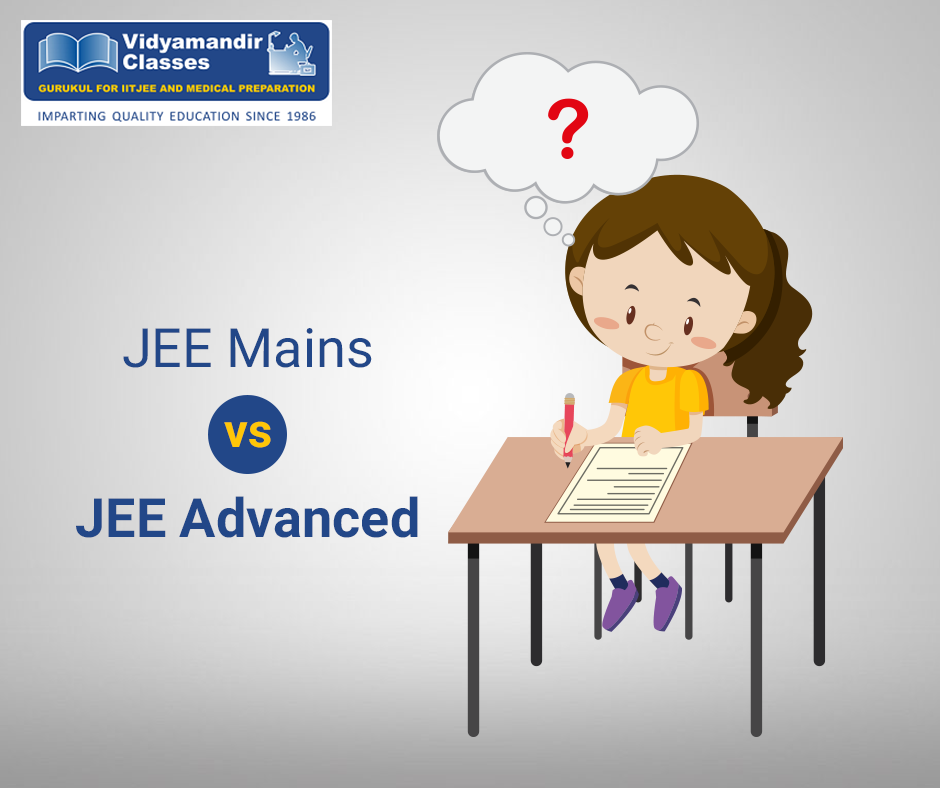JEE Main and Advanced – How do they Differ
 Posted On
Posted On
Every student who aspires to become an engineer in terms of the profession, has the prime priority of being selected in one of the eminent Indian Institutes of Technology (IITs). To qualify for IITs entry criteria, the first step for the aspirants is to pass through the JEE-Main exam. Those who succeed in clearing JEE-Main are eligible to appear for the next big assessment, which is the JEE Advanced examination.
JEE-Main and JEE-Advanced are the entrances to the foremost engineering institutions of the Indian subcontinent. Qualifying through these exams with a commendable ranking brings to you face to face with the golden chance to be enrolled with the top National Institutes of Technology (NITs) and Indian Institutes of Technology (IITs). Getting admission in one of the elite institutes is in all probability the primary ascent en route for a sturdy engineering career.
Although JEE-Main and JEE-Advanced are together engineering entrance exams, there are noticeable discrepancies flanked by the 2 exams.
JEE Main is carried out by the National Testing Agency (previous, it was CBSE), at the same time as JEE Advanced is prepared by the zonal IITs on a rotating system. And hence, JEE Main and JEE Advanced are linked to each other in a way and still apart from each other. Usually, the students are confounded between both the exams. Therefore, this write-up is a venture to bring clarity to this.
This narrative adds up to put out the contrasts between both the exams. Here is a short description that brings out the differences between the two examinations:
Objective:
JEE Main: JEE main is a qualifying exam for JEE Advanced through which one gets admission in to the IITs.
JEE Advanced: This examination is administered for making students eligible to enter undergraduate engineering courses in the offering by all the India Institutes of Technology (IITs)
Thence, the primary difference in the exams is that they are the first gateways to get into different institutes.
Eligibility:
JEE Main: Applicants should have cleared/in the process of appearing for class 12th examination or corresponding plane of education. There is no least qualifying percentage to get into the JEE Main exam. However, for admission to IIITs, NITs, and CFTIs, it is mandatory for the applicants to procure 75% marks (65% for SC/ST), if not this, they have to be in the top 20 percentile bracket in class 12th board exams.
JEE Advanced: The condition for candidates to qualify to appear in the advanced exam is that they should have cleared the JEE Main exam and also, feature in the list of the top 2, 24, 000 candidates.
Frequency of Attempts:
JEE Main: Students can sit for the JEE Main exam for three successive years.
JEE Advanced: Students are eligible for appearing for the JEE Advanced exam for a maximum of two successive years.
Procedure of Exam:
JEE Main: The main examination consists of two papers. Paper I is carried out in the online mode (examinees have the option for one). On the other hand, Paper II can only be given in the offline mode.
JEE Advanced: JEE Advanced is also carried out for two papers. Paper I as well as Paper II, this paper is conducted in the online mode.
Medium of Question Paper:
JEE Main: For every examination venue, question papers are in both, English as well as Hindi languages. For the exam centres in Gujarat, Daman & Diu and Dadra and Nagar Haveli, in addition to English and Hindi the papers are also conducted in Gujarati.
JEE Advanced: The question papers are only presented in English and Hindi languages.
Besides all these variations, the level of complexity in JEE Main is sparingly lesser as compared to that of JEE Advanced.
Up till 2016, JEE-Main rank was given via an aggregate of JEE-Main marks and the regulated board exams marks. In the case of JEE-Advanced, the ranking is determined exclusively based on the outcome in JEE-Advanced.
Considering the above differences, it is easy to know that JEE-Advanced is, in effect, an elevated version of JEE-Main and necessitates a comparatively deeper scale of preparing when matched with JEE-Main.

